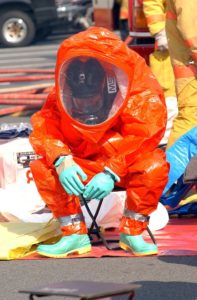When It Looks Like a Work Exposure Caused Cancer
Posted June 7th, 2019 by Anthony Carbone, PC.
Categories: Workers Compensation.
In formal terms, it’s known as occupational exposure. When you learned a work exposure caused cancer, you might feel at a loss. You not only worry about your health and your future. How in the world will you afford your medical bills? What about your lost wages when you’re too sick to do your job? As far as you’re concerned, the answer would be easy if you slipped and fell during the course of your employment. From what you understand, your company would treat any resultant injuries as part of a workers’ compensation claim.
As far as you’re concerned, the answer would be easy if you slipped and fell during the course of your employment. From what you understand, your company would treat any resultant injuries as part of a workers’ compensation claim.
Meanwhile, it’s not as though your cancer came about from one particular incident. Repeated exposure to dangerous substances accounts for sickness all too often. Truth be told, many New Jersey workers have died as a result of asbestos exposure. Proving that work caused your cancer or some other disease often requires the assistance of an experienced workers’ compensation lawyer. Your company and its insurance carrier may fight against you. With that in mind, you may want to see what happened in a recent New Jersey case brought up on appeal.
Work Exposure Caused Cancer
 On April 26, 2019, the New Jersey Appellate Division decided the matter of Proscia v. Advanced Biotech. The court prefaced the written opinion with a note that is unpublished. This means it is not precedential law and can be used in limited circumstances. Nonetheless, the ruling provides valuable insight.
On April 26, 2019, the New Jersey Appellate Division decided the matter of Proscia v. Advanced Biotech. The court prefaced the written opinion with a note that is unpublished. This means it is not precedential law and can be used in limited circumstances. Nonetheless, the ruling provides valuable insight.
- Frank Proscia began working for Advanced Biotech from 2005 until 2012 in Paterson. When the company relocated, he stayed with them until October 2013. Identified as a chemical company, Advanced Biotech manufactures and sells raw natural flavor ingredients.
As is common in occupational exposure cases, experts reviewed the chemicals used in the employer’s facility. The list contained over 1000 substances, many of which included suspected carcinogens. Simply put, the chemicals could cause cancer. The Paterson building flooded frequently and required Frank to put on waders as he walked through the premises. Drums filled with chemicals were all around him. Frank helped manage the operations and also worked with others to pour chemicals. Additionally, Frank examined and sampled containers as they arrived at the facility.
- Notably, Frank’s desk resided just fifteen feet away from the storage room that contained the drums filled with chemicals. In the meantime, Frank detailed the occurrence of multiple spills involving hazardous substances.
When the spills occurred, chemicals would sometimes stick to his skin and clothing. After acetic acid spilled in February 2011, Frank wound up in the hospital for breathing difficulties.
Diagnosed with Colorectal Cancer
 In March 2015, the doctors diagnosed Frank with colorectal cancer. He spoke with an attorney who filed a workers’ compensation claim petition. Frank felt he was due compensation because he worked with chemicals that either caused or contributed to his cancer. Both sides retained experts to offer their opinions concerning the correlation between occupational exposure and the length of the list of chemicals. Neither disputed that some of the chemicals could cause cancer.
In March 2015, the doctors diagnosed Frank with colorectal cancer. He spoke with an attorney who filed a workers’ compensation claim petition. Frank felt he was due compensation because he worked with chemicals that either caused or contributed to his cancer. Both sides retained experts to offer their opinions concerning the correlation between occupational exposure and the length of the list of chemicals. Neither disputed that some of the chemicals could cause cancer.
- At the time of his diagnosis, Frank was only 42 years old. The expert testifying on his behalf categorized Frank’s cancer at stage three or four. Notably, Frank had no history of alcohol abuse, smoking, or a family history of cancer.
Additionally, something else proved relevant. The expert, an oncologist, testified that medical authorities attribute eleven to fifteen percent of colorectal cancer to workplace chemical exposure. Upon conclusion, the expert admitted that she could not say there was a direct causal relationship between cancer or the petitioner’s work exposure. However, she opined with medical certainty that it was likely a contributing factor.
Disagreement between Experts
 Advanced Biotech’s medical expert is also an oncologist. While not disputing that some of the chemicals were carcinogens, the company’s expert disagreed. In fact, the dispute centered around a particular chemical named Acetaldehyde.
Advanced Biotech’s medical expert is also an oncologist. While not disputing that some of the chemicals were carcinogens, the company’s expert disagreed. In fact, the dispute centered around a particular chemical named Acetaldehyde.
Additionally, Advanced Biotech’s expert felt that Frank did not need to stay out of work. And, there was only a 15% likelihood that his cancer would reappear. The workers’ compensation judge found that direct causation was not required in this type of case. Upon review, the Appellate Division agreed. “Proof establishing that the exposure caused the activation, acceleration, or exacerbation of disabling symptoms is sufficient.”
- In this matter, the evidence supported that Frank’s workplace environment exposure contributed to his cancer. He was, therefore entitled to workers’ compensation benefits.
Contact Us
Do you believe you might have a claim for occupational exposure? Contact the Law Offices of Anthony Carbone to schedule an appointment. We will work hard to get you answers and the help you need. CALL NOW 201-829-3805


